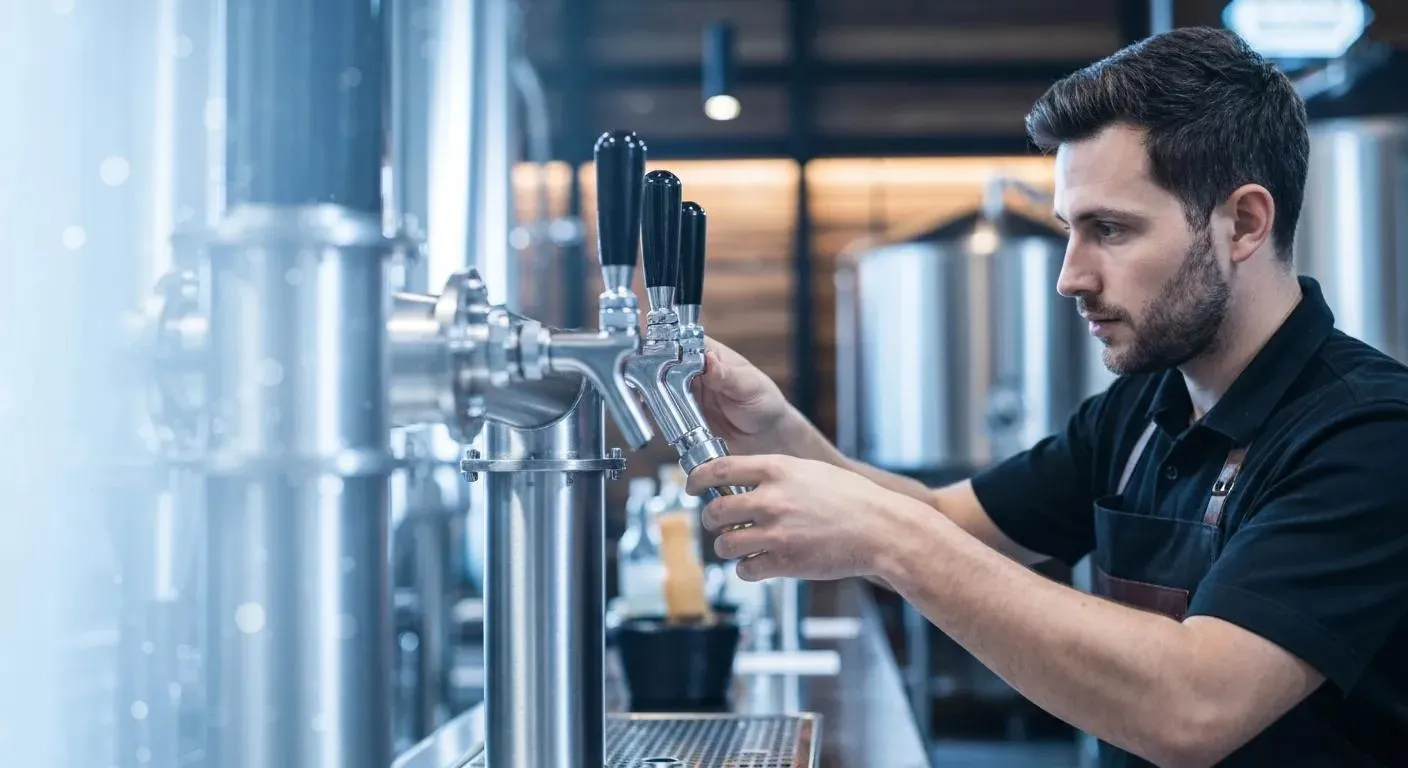Antique Brass Beer Tap: Not Ideal for Dispensing Draft Beer

A brass beer tap is both a functional and aesthetically appealing component in any beer dispensing system. These taps are traditionally used to regulate the flow of beer from a keg or cask, serving as a crucial touchpoint for bartenders and beer aficionados alike. Crafted from brass, a material known for its durability and classic look to bars and pubs, contributes to an establishment's overall ambiance.
The design and functionality of beer taps have evolved, but brass models remain a testament to timeless craftsmanship. While brass taps are appreciated for their vintage charm, it's essential to consider the materials' interaction with the beer they dispense. Modern dispensing systems often favor stainless steel equipment because of its superior resistance to corrosion and the preservation of beer's taste and quality.
- Brass beer taps offer aesthetic appeal and durability for dispensing systems.
- Modern systems commonly use stainless steel to prevent corrosion and flavor taint.
- While brass taps are valued for their classic appearance, functionality and material suitability are critical for quality beer dispensing.
Design and Functionality of Brass Beer Taps
Brass beer taps, known for their traditional aesthetic, serve a key role in the dispensing and flavor preservation of draft beer, and their aluminum ferrule fits seamlessly with standard kegerators, making them compatible with various beer dispensing setups. Their design and material composition can significantly affect the beer’s taste and overall pouring experience.
Types of Brass Beer Taps
There are various designs of brass beer taps, including standard taps and European style faucets. Each tap handle not only enhances the functionality of the tap but also adds to the aesthetic appeal of the bar setup. Standard taps are more common and have a familiar, robust build, while European faucets feature a longer, narrower spout which can reduce the foam head during pouring. Each design caters to different preferences and bar setups, offering choices for proprietors and enthusiasts alike.
Why Brass isn't Good For Pouring Draft Beer Tap
Brass taps can impart an undesirable metallic flavor to beer, particularly if the interior is not properly maintained. A well-crafted beer tap handle, such as one made from black walnut and stained a deep brown, can enhance the aesthetic appeal of your setup. This is due to the interaction between the beer and brass material, which can occur because brass is an alloy of copper and zinc. To preserve the intended flavor profile of the beer, it’s often recommended to use stainless steel faucets, as these do not impart additional flavors and are resistant to the acidic nature of certain brews. Additionally, brass taps are susceptible to tarnishing and require a protective coating to prevent direct contact with beer.

Maintenance and Cleaning
Regular maintenance and cleaning are crucial for brass beer taps to prevent flavor taint and ensure a hygienic dispense. The vintage solid brass finial is often set on a handcrafted black walnut handle, showcasing a beautiful combination of materials and craftsmanship in beer tap handles. It involves disassembling the tap, using special beer line cleaners, and thoroughly scrubbing all the components.
The Importance of Proper Tap Care
Proper tap care is essential to ensure the quality and taste of your beer. A well-maintained beer tap can make all the difference in the flavor and aroma of your favorite brew. Neglecting tap care can lead to contamination, and bacterial growth, and even affect the overall performance of your tap. Regular cleaning and maintenance can help prevent these issues and keep your beer tasting great.
Best Practices for Tap Care and Maintenance
To keep your beer tap in top condition, follow these best practices:
- Clean your tap regularly with a mixture of warm water and beer line cleaner. This helps remove any residue that can affect the taste of your beer.
- Dry your tap thoroughly after cleaning to prevent water spots and potential rusting.
- Check your tap for any signs of wear or damage, and replace any worn-out parts promptly to ensure smooth operation.
- Store your tap in a dry, cool place when not in use to prevent any moisture-related issues.
By following these simple steps, you can ensure your beer tap remains in great condition and continues to deliver the best-tasting beer.
The Impact of Poor Tap Care on Beer Quality
Poor tap care can have a significant impact on the quality of your beer. Contamination and bacterial growth can affect the flavor, aroma, and overall character of your beer. In addition, a dirty or clogged tap can cause the beer to flow slowly or unevenly, leading to a poor drinking experience. Furthermore, neglecting tap care can also lead to the growth of unwanted microorganisms, which can spoil your beer and affect its overall quality.
By prioritizing proper tap care and maintenance, you can ensure that your beer tastes great and remains fresh and flavorful. Whether you’re a beer enthusiast or a bar owner, taking care of your tap is essential to delivering the best possible beer experience.
Use Stainless Steel Dispensing Equipment
When designing or upgrading a draft beer system, one should be aware of the benefits of using stainless steel dispensing equipment. Each item, such as beer faucets, couplers, and shanks, can be reviewed or purchased based on its specific features and quality. Stainless steel is acclaimed for its durability and resistance to corrosion, which is pivotal in maintaining beer quality and equipment longevity.
Material Properties:
- Sustainability: Stainless steel is a recyclable material, promoting environmental responsibility.
- Hygiene: This material does not harbor bacteria, ensuring the beer’s flavor remains untainted.
Comparison with Other Materials: While brass components in beers are common, they may lead to a metallic taste and require more maintenance. Stainless steel, on the other hand, does not impart unwanted flavors into the beer and can withstand rigorous cleaning routines.
Material Benefits Considerations Brass is Corrosion-resistant to an extent Potential for flavor alteration; requires protective surface coatings Stainless Steel has Superior hygiene, durability Higher upfront cost, offset by longevity
Experts in the field, such as those at Draft Beer Intelligence, highlight the importance of stainless steel in preventing contamination and corrosion resistance and avoiding the leaching of metals like copper, which can be present in other materials.
The integration of stainless steel components is not just recommended for the faucets, but for all parts that come into contact with beer, including beer couplers, beer shanks, faucets, and hose fittings. Maintaining the integrity of beer starts with high-quality equipment like 304 stainless steel parts, which are often recognized as a standard in the industry for their reliability and safety.
Why Stainless is Better
When choosing materials for beer taps, stainless steel often leads due to its inherent properties that exhibit resilience and longevity. Only one of the vintage solid brass finial beer tap handles is available for purchase, so act fast to secure it and consider the shipping details for delivery. Stainless steel faucets do not affect the taste of the beer, as they don’t impart any metallic taste. Unlike other materials, stainless steel does not corrode over time, making it a reliable choice for both commercial and home use.
- Durability: Stainless steel is known for its strength and resistance to wear and tear.
- Sanitation: The non-porous nature of stainless steel inhibits the growth of bacteria and yeast, which can negatively impact beer flavor and quality.

In terms of maintenance, beer faucets made from stainless steel are easier to clean and are less susceptible to the easy buildup of deposits. This contributes to a cleaner system with less frequent need for intensive cleaning.
Moreover, stainless steel faucets are often recommended for their chemical inertness. They do not leach substances like copper or lead into the body of the beer, which can occur with some brass or chrome-plated options. This attribute specifically ensures that the beer retains its intended taste and purity.
Comparatively, when testing copper levels in beer samples, higher levels were found in beer that had flowed through chrome-plated faucets as opposed to stainless steel ones.
Furthermore, for those with an eye on aesthetics, stainless steel offers a sleek and timeless appearance that remains visually appealing without the risk of tarnishing.
To summarize, the use of stainless steel in beer taps provides:
- A longer lifespan
- Better flavor preservation
- Higher sanitary standards
- Minimal maintenance
Considering these factors, one can see why stainless steel is a preferred choice for many when it comes to beer dispensing systems.
Summary
In conclusion, while brass beer taps have long been favored for their traditional aesthetic and historical significance in beer dispensing systems, they present several drawbacks that can affect the quality of the beer. Brass, being an alloy of copper and zinc, can impart a metallic taste to the beer if not properly maintained, and is susceptible to tarnishing and corrosion. These issues can compromise the flavor and safety of the beer, making them less ideal for modern dispensing needs.
Conversely, stainless steel taps offer significant advantages. They are resistant to corrosion, do not impart unwanted flavors, and maintain the integrity of the beer's taste. Stainless steel is also easier to clean, hygienic, and durable, making it a superior choice for both commercial and home use. As a result, many establishments are transitioning to stainless steel dispensing equipment to ensure a purer beer flavor and a more reliable system. For those seeking to enhance their beer dispensing setup, stainless steel taps provide a long-lasting, sanitary, and taste-preserving solution.



